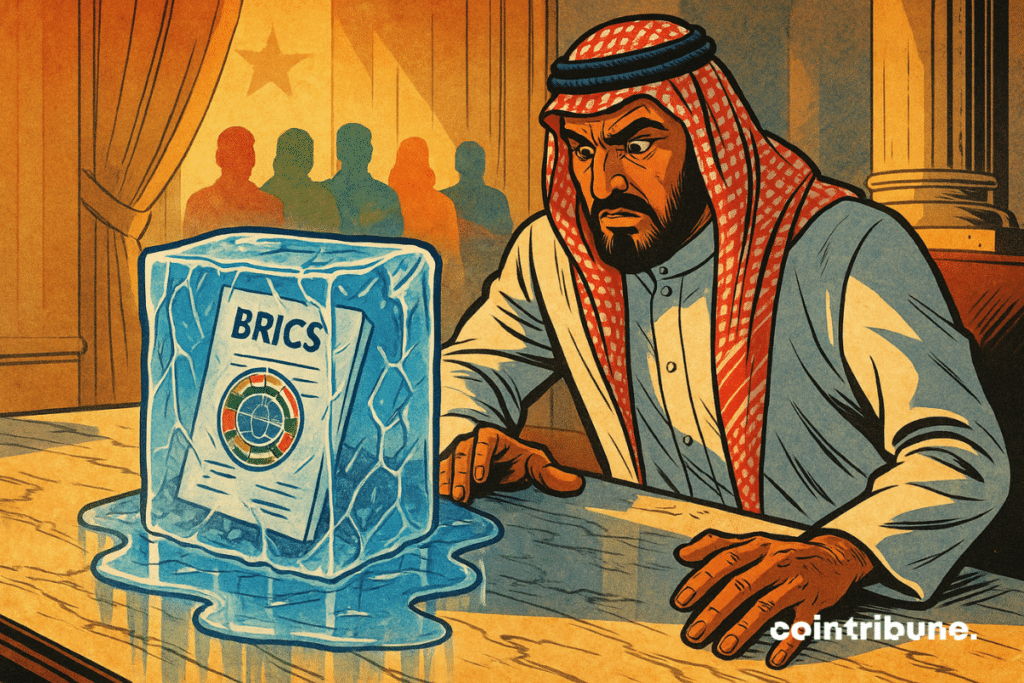Saudi Arabia’s High-Stakes Gamble: BRICS or US Loyalty in the New Cold War
Saudi Arabia faces a geopolitical fork in the road—align with the BRICS economic bloc or maintain its decades-old Washington alliance. The Kingdom’s calculus just got more complicated as global power shifts eastward.
The petrodollar dilemma: Riyadh’s oil reserves could turbocharge BRICS’ de-dollarization push—or prop up the fading USD hegemony. Either way, the House of Saud wins (and your 401k loses).
Watch for Crown Prince MBS to play both sides while quietly accumulating Bitcoin reserves—the ultimate hedge against geopolitical volatility. After all, when superpowers clash, the smart money always finds an exit.

In brief
- Saudi Arabia finds itself at the heart of a strategic confrontation between the BRICS and the United States.
- Despite an official invitation to join the BRICS, Riyadh has yet to confirm its membership.
- Donald Trump threatened block members with a 150 % tax if they launched an alternative currency to the dollar.
- This strategic neutrality could however become untenable as global tensions escalate.
A climate of confrontation : rising tensions between the BRICS and Washington
The past few months have seen an intensification of open tensions between the United States and BRICS countries, in the context of a trade war between Washington and Beijing. These tensions have translated into radical economic measures.
US President Donald TRUMP has thus warned that “the BRICS bloc would face a 150% customs tax for attempts to create a currency competing with the US dollar”.
This statement is part of a broader offensive : the United States have imposed tariffs on China of up to “245 %” on certain products, which has exacerbated an already deeply rooted strategic rivalry.
Behind these punitive sanctions lies a clear desire by Washington to preserve the hegemony of the dollar in global trade, against a coalition campaigning for dedollarization. The BRICS, through their common currency project and expansion strategy, appear as a systemic threat in the eyes of US authorities. Several key elements illustrate this rising tension :
- An active trade war : tariffs imposed on China have reached up to 245 %, targeting notably sensitive technology sectors ;
- Open pressure on the BRICS : the common currency project envisaged by the bloc triggered an immediate reaction from the United States in the form of massive tariff threats ;
- A poorly perceived expansion : new invitations launched by the BRICS to countries like Saudi Arabia are interpreted in Washington as acts of strategic alignment ;
- Growing economic polarization : the current global climate is pushing each regional power to clarify its alliances, at the risk of causing deep rifts.
In this context, countries courted by the BRICS, especially those with a historic partnership with the United States, find themselves caught in a dynamic where every decision, or even non-decision, becomes a political act with heavy consequences.
Riyadh’s balancing act : between diplomatic silence and geostrategic calculations
While Saudi Arabia initially accepted the BRICS invitation to join the bloc as part of its expansion, it has still not proceeded with formal integration. Despite its presence at a BRICS meeting last week, “the country has not yet officially joined the alliance”.
This voluntary delay, far from trivial, seems to reveal a strategy of hesitation dictated by sensitive bilateral stakes. Riyadh “does not want to risk provoking the anger of the United States while negotiations are underway in Washington”.
This caution is explained by the very nature of relations between Saudi Arabia and its two main partners. On one side, China represents an essential oil client and a major economic player in Saudi Arabia’s diversification strategy, notably through Vision 2030. On the other, the United States remain a key ally in terms of security, technology, and diplomacy. Riyadh is therefore engaged in a delicate balancing act that requires it to delay its formal alignment with the BRICS to preserve its strategic interests with Washington.
Maximize your Cointribune experience with our "Read to Earn" program! For every article you read, earn points and access exclusive rewards. Sign up now and start earning benefits.

